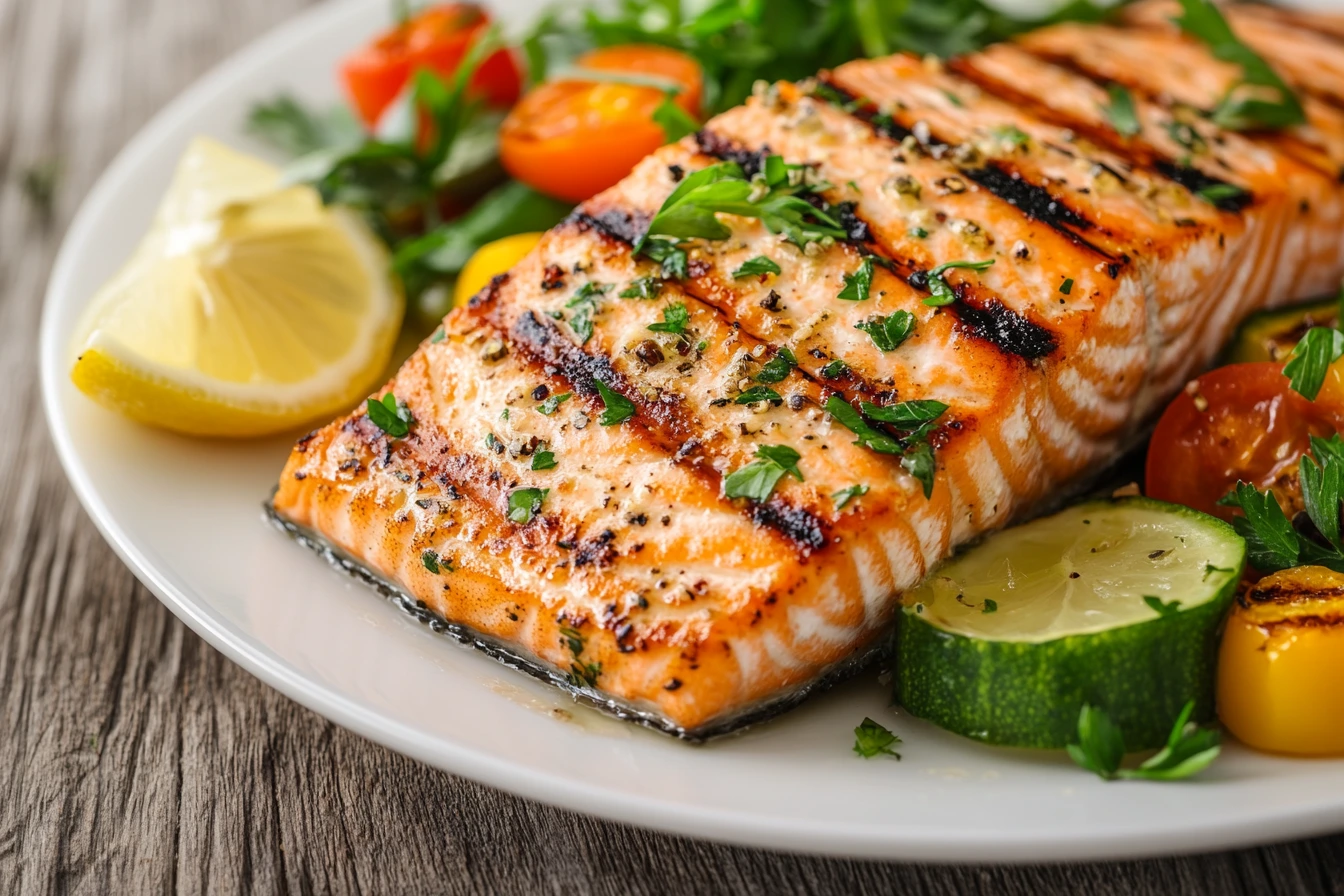Salmon is an incredibly nutritious fish that provides numerous health benefits. Rich in Omega-3 fatty acids, high-quality protein, vitamins, and minerals, salmon plays a vital role in a healthy diet. But when it comes to portion size, is 1lb of salmon too much to eat in one sitting? This question often arises for those who love salmon or want to enjoy its health benefits without overindulging. Eating the right amount of food is essential for maintaining a healthy lifestyle, and salmon is no exception. While 1lb of salmon might seem like a good portion size for a hungry individual, it’s essential to consider whether that amount provides more nutrients and calories than your body needs. Let’s break it down.
How Much Salmon Per Serving is Recommended?
Before we determine if 1lb of salmon is excessive, let’s first explore the typical serving size recommended by experts. According to dietary guidelines, an average adult should consume about 3 to 6 ounces of salmon per meal. This amount balances nutrition and calorie intake while ensuring you get the essential health benefits of this fish. But why is 3-6 ounces the sweet spot? It’s a size that delivers the nutrients of salmon without overwhelming your calorie goals. This portion is ideal for maintaining a healthy and well-rounded diet. Factors like age, gender, and activity level also influence the appropriate serving size. For instance:
- Men typically consume slightly more than women due to their higher caloric needs.
- Athletes or physically active individuals may need a bit more to meet their protein and energy demands. The key is to stay within recommended portion sizes to ensure your meals are balanced. For more information on different ways to cook and enjoy salmon, check out this guide on the best cooking tips and health benefits of 1lb salmon steak. This will provide further insight into proper portion sizes and cooking methods.
How Many Calories and Nutrients Are in 1lb of Salmon?
Now, let’s look at the caloric and nutritional content of 1lb of salmon. While smaller portions like 6-ounce servings contain about 200-300 calories, 1lb of salmon delivers roughly 800-1,000 calories. That’s a significant difference, especially if you’re trying to maintain a balanced diet or manage your weight. Here’s the breakdown of what 1lb of salmon typically contains:
- Calories: Around 1000 calories per pound
- Protein: 90-100 grams
- Fat: 55-60 grams, primarily from Omega-3 fatty acids
- Vitamins and Minerals: Includes vitamins B12, D, selenium, and potassium Salmon is known for being nutrient-dense, which means it provides a high amount of essential nutrients relative to its calorie content. However, consuming 1lb of salmon may provide you with more calories than you need in a single meal. While you’ll certainly get plenty of healthy Omega-3s and protein, you might also end up eating more than your daily caloric requirement. If you’re curious about how salmon fits into your weekly meal plan, you might want to explore whether 1lb of salmon is enough for two people. Understanding portion sizes can help you make smarter decisions about your diet.
Health Benefits of Eating 1lb of Salmon
It’s no secret that salmon is one of the healthiest fish to consume. Its high content of Omega-3 fatty acids promotes heart health, reduces inflammation, and supports brain function. Studies show that regular consumption of fatty fish like salmon can decrease the risk of chronic diseases, including heart disease and arthritis. Let’s dive into some of the key benefits.
Does Eating 1lb of Salmon Improve Heart Health?
The Omega-3 fatty acids in salmon are crucial for cardiovascular health. These healthy fats help lower triglyceride levels, reduce blood pressure, and prevent arterial inflammation. Regular consumption of salmon has been linked to a reduced risk of heart attacks and strokes.
Brain Function and Cognitive Benefits of Consuming 1lb of Salmon
Salmon is also rich in DHA (Docosahexaenoic acid), a type of Omega-3 that is essential for brain function. DHA supports cognitive function and may help protect against mental decline as we age. Eating salmon may also help reduce symptoms of anxiety and depression due to its high Omega-3 content.
Weight Loss and Metabolism Benefits of Eating Salmon
One of the best benefits of salmon is its ability to aid in weight loss. The high protein content in salmon keeps you feeling fuller for longer, reducing overall calorie intake throughout the day. Moreover, Omega-3s have been shown to increase metabolic rates, further supporting fat burning and weight management. However, like anything, there are limits. Consuming excessive amounts of salmon can lead to digestive discomfort and potential overconsumption of fats, even if they’re healthy fats. Can I Eat Salmon Everyday? highlights the need for moderation and ensuring you’re balancing your diet with other food sources.
Is 1lb of Salmon Too Much to Eat in One Meal?
While the benefits of salmon are clear, moderation is essential. Eating too much can lead to issues, including excessive calorie intake and exposure to contaminants like mercury and PCBs (polychlorinated biphenyls). Consuming up to 1lb of salmon occasionally won’t pose immediate health risks, but it’s not advisable to do so frequently. The FDA recommends limiting salmon intake to 2-3 servings per week, which totals about 8-12 ounces. This amount provides adequate Omega-3s without overloading your system with potential toxins. For example, while salmon is a low-mercury fish, it still contains some mercury, and eating large quantities over time can pose health risks.
Should You Worry About Mercury in Salmon?
Mercury is a heavy metal that accumulates in fish due to pollution. Although salmon generally has lower mercury levels than larger fish like swordfish or shark, consuming large amounts can still contribute to mercury buildup in your body. This is particularly concerning for pregnant women and young children, whose nervous systems are more vulnerable to mercury’s toxic effects. To ensure you’re consuming safe amounts of salmon, aim for 8-12 ounces per week. If you’re eating more than that, you might be exposing yourself to unnecessary risks. For portion guidance, you can refer to this resource on whether 1lb of salmon is enough for two people.
Can Eating 1lb of Salmon Cause Digestive Issues?
If you eat 1lb of salmon in one meal, it might not be harmful once in a while, but it can cause discomfort. You may experience bloating, indigestion, or an uncomfortably full stomach. Large portions of high-protein foods can also strain your kidneys and digestive system, especially if you’re not used to consuming that much in one sitting.
Too much protein at once can be challenging for your body to process. While salmon is incredibly healthy, your body can only absorb so many nutrients at one time. Consuming more than you need might lead to an imbalance in your nutrient intake. Other essential food groups like vegetables or grains might get left out of your meal.
If you’re planning to cook 1lb of salmon, a good strategy is to divide the portion and save some for another meal. Not only will you avoid overloading your digestive system, but you’ll also have a delicious salmon dish ready for another day!
How Often Should You Eat Salmon Per Week?
Salmon is one of the healthiest foods you can add to your diet. Eating it 2-3 times per week is ideal. The American Heart Association recommends that adults consume fatty fish like salmon at least twice a week to support heart health. However, balance is critical. Don’t rely solely on salmon; incorporate other healthy proteins like chicken, beans, and tofu to diversify your meals and maintain a balanced nutrient intake. By diversifying your diet, you avoid potential problems from overconsumption of any single nutrient or contaminant found in fish. Plus, eating a variety of protein sources ensures you’re getting a wider range of vitamins and minerals.
How Much Salmon Is Too Much Per Week?
While 8-12 ounces of salmon per week is the sweet spot, you might wonder if there’s such a thing as too much salmon. If you’re eating more than 3-4 pounds per week, you may be overdoing it. The danger lies in potential long-term exposure to mercury and other pollutants. How Much Salmon is Safe to Eat in a Week? clarifies the risks of eating too much seafood and how to avoid mercury buildup in your system. By sticking to the recommended guidelines, you can ensure that your salmon intake is both safe and beneficial.
Can Eating 1lb of Salmon Help You Lose Weight?
Despite its high-calorie count, salmon is excellent for weight loss when eaten in moderation. Its high protein content keeps you feeling fuller for longer, preventing overeating. Moreover, the Omega-3s in salmon may enhance your body’s ability to burn fat by improving metabolism. However, eating 1
lb of salmon at once may lead to overconsumption of calories, counteracting any weight-loss benefits. Instead, try incorporating smaller portions of salmon into balanced meals. Combined with exercise and a healthy lifestyle, salmon can be a valuable tool for maintaining a healthy weight.

Grilled Salmon Recipe for One Pound
Grilling salmon is a delicious and healthy way to prepare this fish. Here’s an easy recipe for grilling 1lb of salmon:
Ingredients:
- 1lb of salmon fillets
- 2 tablespoons olive oil
- 2 cloves garlic, minced
- Juice of one lemon
- Salt and pepper to taste
Instructions:
- Preheat the grill to medium heat.
- Brush the salmon fillets with olive oil and season with garlic, lemon juice, salt, and pepper.
- Grill the salmon for about 4-6 minutes per side or until it flakes easily with a fork.
- Serve with steamed vegetables or a side salad for a balanced meal.
This recipe is perfect for when you want to prepare a healthy, satisfying meal with minimal ingredients.
Baked 1lb Salmon with Herbs Recipe
Baking salmon with herbs is another simple and flavorful method. Here’s how to make it:
Ingredients:
- 1lb salmon fillets
- 1 tablespoon olive oil
- 1 teaspoon dried thyme
- 1 teaspoon rosemary
- Zest of one lemon
- Salt and pepper to taste
Instructions:
- Preheat the oven to 375°F.
- Place the salmon fillets in a baking dish and drizzle with olive oil.
- Sprinkle with thyme, rosemary, lemon zest, salt, and pepper.
- Bake for 12-15 minutes or until the salmon flakes easily with a fork.
- Serve with roasted potatoes and sautéed greens for a complete meal.
Frequently Asked Questions (FAQs)
How much salmon is too much in one sitting?
Typically, eating more than 8 ounces in one sitting is considered too much. It may cause digestive discomfort or result in excessive caloric intake.
How much salmon should I eat for protein?
A 3-ounce serving of salmon provides around 20 grams of protein, which is ideal for most meals.
Can you eat salmon every day?
While salmon is healthy, experts recommend eating it 2-3 times per week rather than daily to avoid mercury buildup.
What is the healthiest way to cook salmon?
Grilling or baking salmon is the healthiest method, as it preserves the nutrients without adding unhealthy fats.
What are the side effects of eating too much salmon?
Overconsumption may lead to digestive issues and mercury exposure, particularly if eaten in excess regularly.
Conclusion
In conclusion, while eating 1lb of salmon occasionally isn’t dangerous, it’s important to consider portion control. Stick to 3-6 ounces per serving for balanced meals. By doing so, you’ll enjoy all the health benefits of this nutritious fish while minimizing potential risks like mercury exposure and overeating. Be mindful of your weekly intake and aim to diversify your diet with other protein sources. Salmon is a powerful addition to your diet when consumed in moderation.


1 thought on “Is 1lb of Salmon Too Much? Health Benefits and Portion Guide”